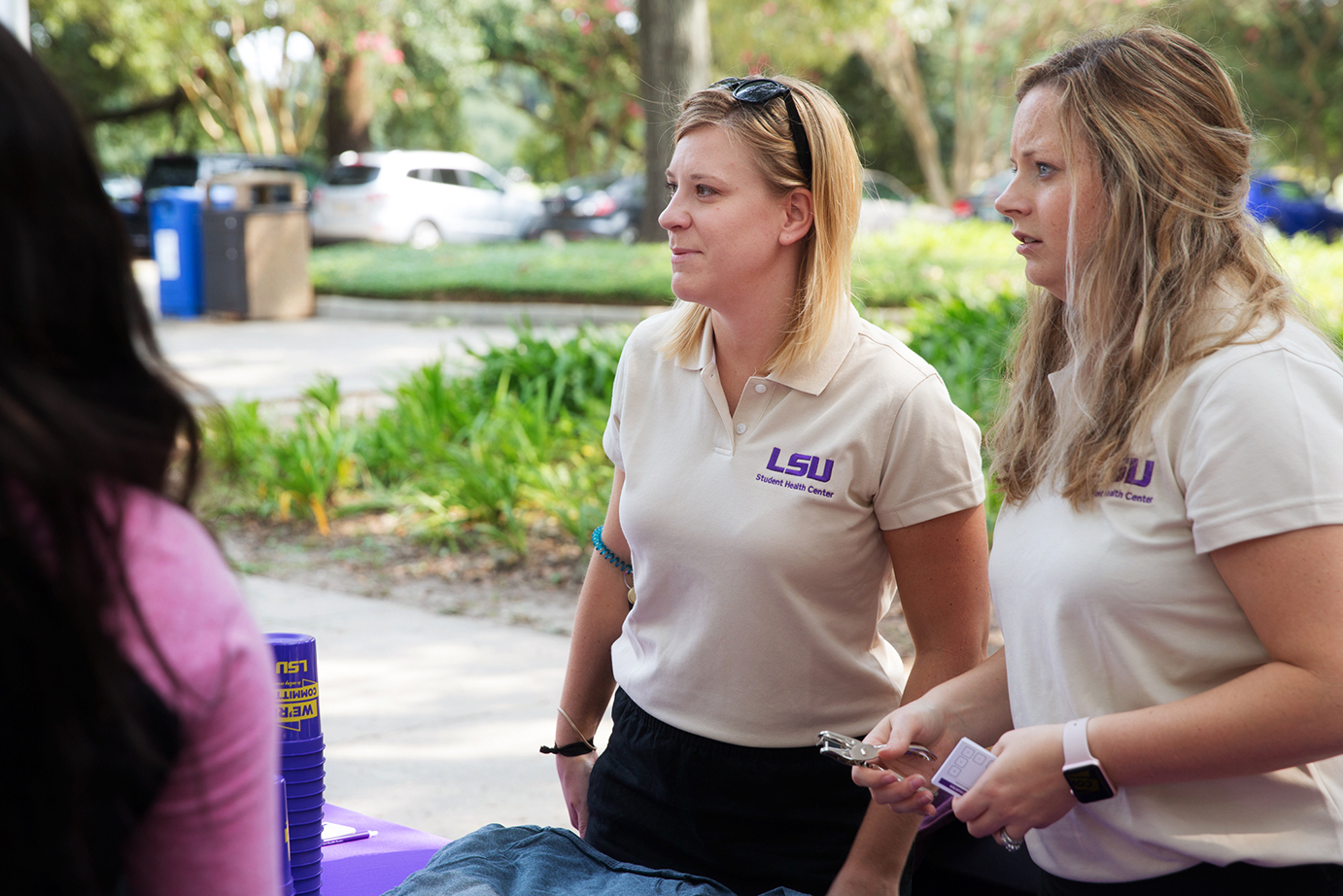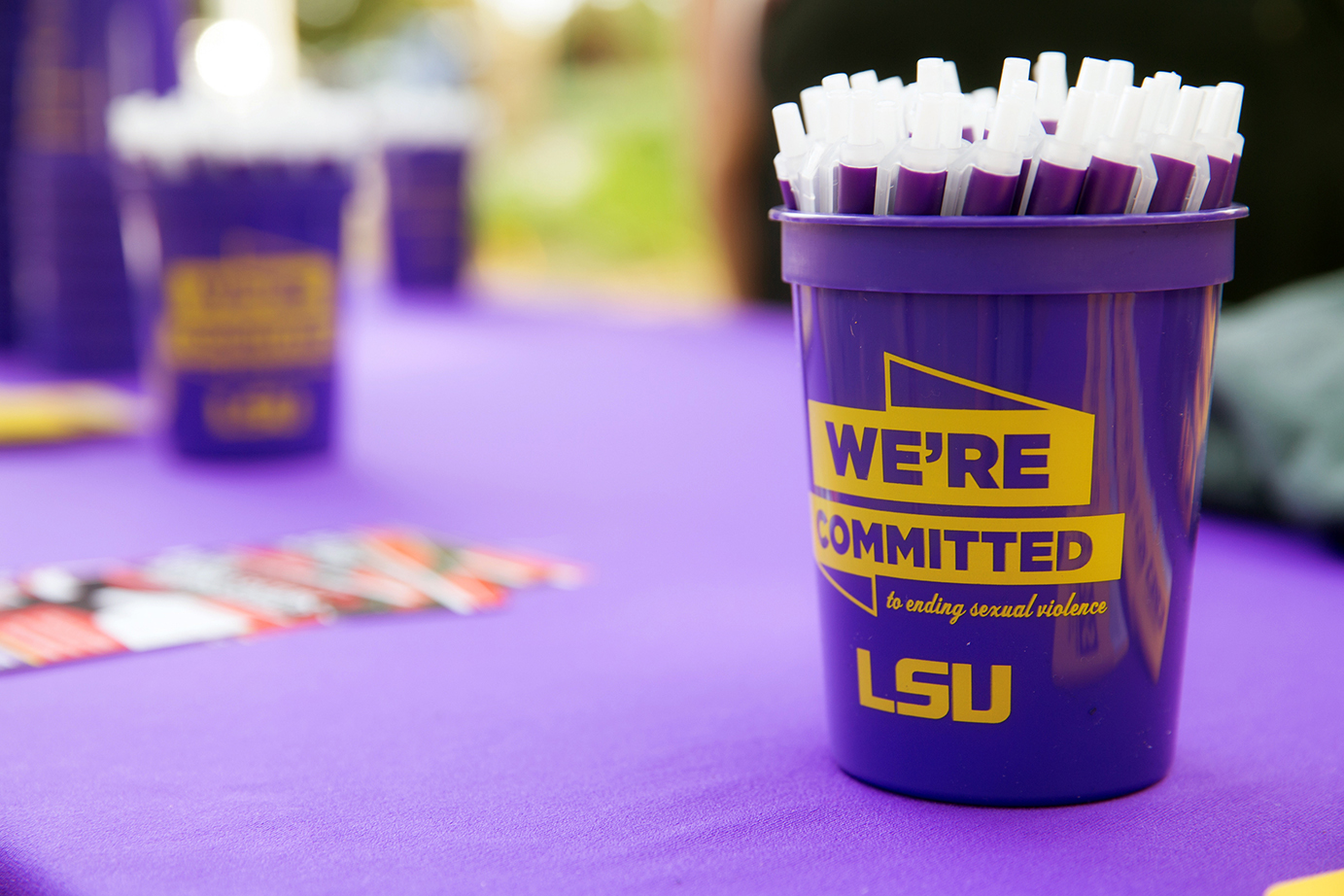
LSU’s Lighthouse Program takes aim at campus sexual assault
For a survivor of college campus sexual assault, the incident itself is only the beginning.
During the initial ringing shock in the immediate aftermath, a survivor must run through a mental checklist of questions, even as the trauma still sinks in: “Should I tell someone? Should I see a doctor? Am I hurt? Am I going to report it?”
And the most dreaded question of all: “Will anyone believe me?”
|
|
Depending on law enforcement, university cooperation and the student’s choice of action, the ongoing process can grind salt into the wound—invasive medical exams, disciplinary hearings and courtroom testimonies that revisit the trauma; public scrutiny; the judgment of peers. All this inflicted, in many cases, by another student who chose to ignore consent.
We’ve seen the stories in the news. Last year, LSU’s Pi Kappa Alpha Fraternity chapter voluntarily suspended activities following allegations of sexual assault at a party.
Across the country, Emma Sulkowicz famously began carrying her dorm room mattress around in 2014 at Columbia University to protest its alleged mishandling of her sexual assault by a male student. Last year, convicted Stanford rapist Brock Turner received only six months jail time for assaulting a female student behind a dumpster. Many saw his sentencing as too lenient, and the powerful, poignant letter read by the survivor in the courtroom sparked another round of national debates.
At the heart of these debates: the survivors—young students of all genders for whom classrooms and dormitories have become potential spots for a traumatic encounter with their rapists, for whom university resources may or may not be doing enough.
“Our motto is: Here’s a menu of services that we offer. Choose what you want. You don’t have to take any of them, and also if you don’t think you need them now and you find you need them a few months down the line, our offers don’t expire.”
Susan Bareis, head of LSU’s Lighthouse Program
The Trump administration has already begun redefining Title IX of the Education Amendments Act, which in part sets federal standards for the rights of campus sexual assault survivors.
If you ask Susan Bareis, assistant director of wellness and health promotion at LSU, she’ll tell you the university is ahead of the curve when it comes to preventing such incidents from recurring—and handling them if and when they do.
Bareis heads up the Lighthouse Program, a one-stop project under Student Health Services aimed at preventing campus sexual assault with education on consent and bystander intervention. The organization also assists survivors with myriad options to move forward.
Whether a student ends up there by Title IX reporting, referral from the Student Health Center or LSUPD or directly reaching out, the Lighthouse team aims to ensure no student stays silent or suffers alone for fear of being judged or called a liar.
“My main role in coordinating this program is advocating for the students,” says Bareis, who holds a master’s degree of public health from the University of Florida. “Providing them the support they need to navigate all the resources and different departments on campus or off campus that they might be having to deal with after something has happened to them.”
For a survivor’s health and well-being, the Lighthouse Program will help with setting up mental health counseling on or off campus. The program also can coordinate and cover costs of services at the Student Health Center after an assault, including a forensic exam and evidence collection, HIV and STI testing, and medical followups in three and six months.
Say a student was assaulted by another resident in the same residential hall—Bareis and her team can work with Residential Life to have the victim relocated across campus and help lessen the chances of further interactions with an assailant.
For off-campus students, Residential Life reserves emergency housing for any student that may need to escape a dangerous domestic situation.
Lighthouse also works with Disability Services to secure extended deadlines or other accommodations if the aftermath of an assault is affecting a student’s grades, and with Student Advocacy and Accountability if a student decides to report to the university for disciplinary action.
If a student wants to pursue legal options, Lighthouse will help with filing a report with LSU’s Police Department (or the appropriate jurisdiction if the assault happened off campus). They can also connect the student to local nonprofit STAR’s (Sexual Trauma Awareness and Response) legal aid team.
“Our motto is: Here’s a menu of services that we offer. Choose what you want,” Bareis says. “You don’t have to take any of them, and also if you don’t think you need them now and you find you need them a few months down the line, our offers don’t expire.”
Though the program was first formed as Sexual Assault Victims Advocacy in 2003, the past few years have seen it rebranded as Lighthouse as part of a push for awareness within the student body, and student engagement has since increased. Lighthouse was revamped with educational materials that focus on consent and bystander intervention, designed to be specifically relevant to LSU’s student body in particular.
The key is zeroing in on LSU’s drinking and partying culture. That includes tailgating—the school has seen a correlation between home football games and sexual assaults, Bareis says.
“Our numbers are increasing every year for the number of students that we have contact with,” she says, “and I don’t think that’s necessarily that there’s this large increase in interpersonal violence; it’s that students are aware of the resources.”
Closely entwined with Lighthouse is We’re Committed, a university initiative run by students and spearheaded by student government. The group’s mission is to end sexual violence and create and maintain a community of respect. It is part of the national “It’s On Us” campaign against campus sexual assault launched by President Barack Obama in 2014, founded on LSU’s campus in 2015 by 21-year-old kinesiology senior Camille Faircloth.
We’re Committed focuses on the three main aspects of sexual assault awareness: prevention (educating students on consent and healthy relationships), intervention (active bystander training) and postvention (directing survivors of assault to Lighthouse).
Faircloth and other students involved in We’re Committed work with university groups from athletics to resident assistants to create educational videos and presentations, and speak directly with students in places where they feel comfortable, from voices to which they can relate. Student volunteers often lead presentations on consent and intervention at Greek houses to prevent more incidents like Pi Kappa Alpha Fraternity’s 2016 suspension for alleged sexual assult or Sigma Alpha Epsilon’s 2013 suspension for alleged sexually based hazing.
“It’s all about leaving a place better than you found it,” Faircloth says. “The national statistic is that one in four women will experience some form of sexual violence before she graduates from college, and that’s 25% of the female population on campus. And if I can have some small role in turning that number into one in a hundred or one in a million or not even a statistic anymore, then that’s all the motivation that I need.”
There’s still much to be done, with LSUPD logging a handful of reports of sexual assaults on campus each semester and many more likely going unreported.
A survey of about 1,500 randomly selected students at LSU found that while most believed a reported assault would be taken seriously by faculty, many may still fear retribution from peers.
Student feedback like this points to a cultural problem with rape and sexual assault bigger than LSU—one that Lighthouse is trying to combat on a micro scale.
But advocates like Faircloth and Bareis are working hard to implement initiatives through We’re Committed and the Lighthouse Program that aim to make the campus safer for everyone.
“They’re getting their power back,” Bareis says of students who come to Lighthouse. “They don’t have to do anything. It’s their choice. It’s free. It’s confidential. I don’t have to get LSU administration involved if that’s not what they choose. Ultimately, I want them to feel safe and be able to process and cope with something traumatic that has happened and [let] them know that there’s not one normal, typical way for someone to cope with something. I have an easy job in saying, ‘I believe you.’”
LSU STUDENTS WEIGH IN ON CAMPUS SEXUAL ASSAULTS
About 1,500 randomly selected students were polled by the Lighthouse Program to assess the climate at LSU.
I have confidence that my school’s administrators will follow the procedures necessary to address complaints of sexual assault fairly.
Strongly disagree 5%
Disagree 12%
Neither agree nor disagree 28%
Agree 43%
Strongly agree 12%
If someone were to report a sexual assault to administrators at your school, how likely is it that: Administrators would take the report seriously?
Not at all likely 1%
Somewhat likely 9%
Moderately likely 22%
Very likely 43%
Don’t know 26%
Students would consider the person making the report to be a troublemaker?
Not at all likely 21%
Somewhat likely 22%
Moderately likely 17%
Very likely 14%
Don’t know 26%
Since the start of this academic year, I have observed a situation that I believe was, or could have led to, sexual assault.
Yes 13%
No 87%
Data courtesy Lighthouse Program, lsu.edu/lighthouse. Numbers rounded to the nearest whole number.
WHAT IS CONSENT?
This is the quick guide that We’re Committed, a student-led campus sexual assault awareness initiative, uses to educate LSU students on consent.
1. Silence is not consent.
2. Consent cannot be given when under the influence of drugs or alcohol.
3. Past consent does not imply future consent.
4. Consent is a verbal “yes.”
5. Consent can be revoked at any time.
This article was originally published in the November 2017 issue of 225 magazine.
|
|
|



